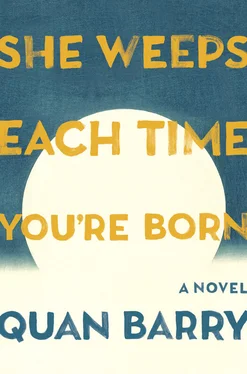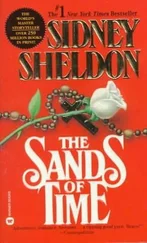
The poets say the rabbit on the moon pounds the medicine in vain. Some say it is the elixir of life she is grinding in her stone mortar, others that the rabbit mills rice for mooncakes. Along the Silk Road there are triadic images of three hares with only two ears between them. Among the Reindeer People there is a tale of the rabbit who had nothing to give the wanderer-god but the flesh of her own body and so threw herself into the fire and was immortalized on the face of the moon .
IT WAS A FULL MONTH BEFORE THE RUSSIAN STOPPED TO ASK for a lemon. Rabbit saw him standing by the iron gate. Farther up the boulevard the sun rose over the distant yellow hills. The other Russians were headed for the trucks that would take them out to the Nam Yum, the river often iridescent with run-off, pearly. She wondered what they did out there at the old battleground. With each trip they trucked the equipment back and forth to prevent the locals from scavenging and selling off the metal. Some of the more daring locals remained undeterred. They would come out at night after the Russians had left and begin tapping the ground with sticks, at times digging with nothing but their own bare hands.
Even among the Russians who drove out to the Nam Yum each morning he was like nothing Rabbit had ever seen. A long scar braided the side of his neck, twisting down his throat in three sections as if someone had taken an iron to the skin and kissed it here, here, and here. She remembered the first time she’d ever seen him. She had been boiling water for the Vietnamese laborers building the school across the street. From out of the crowd a pair of icy eyes trained on her. She thought of Bà on the rubber plantation and the man with the milky-white palms sitting cross-legged under the cashew tree, Bà’s heart flooding. Rabbit could feel the heat gathering in her own blood. The heart flooding maybe once in a lifetime.
Through the days and weeks she had come to notice a silver ring on one of the Russian’s fingers. The ring face was flat but embossed with a flowery creature shaped like a dragon. Mornings he would wander up the dusty boulevard toward the trucks, the sound of the ring clanking on the metal as he ran his hand along the iron fence. For a long time afterward she could hear a soft ringing hanging in the air.
At the end of the government’s third five-year plan the Russians were everywhere. Rabbit couldn’t remember when they began appearing. One day the streets were simply filled with men pale as milk, bodies like mountains, even the women big as trees, and the men with hair blanketing their faces, not the sparse wiry hairs of the Vietnamese men, boys her own age searching their chins for just one, the mark of wisdom, these men with their entire throats furred like wild animals. There was talk that their whole bodies were like that, their torsos like pelts, the dark hair growing coarser as it moved down their forms.
It’s cold in their country, said Giang, who walked out through the unlatched gate of the foreign workers’ dormitory every morning before the sun came up, her scarlet lipstick long faded. In the dark Giang would hand Rabbit five hundred dong and watch the honey run into the cup. It’s so cold, sometimes the sky freezes and falls to earth, Giang knowingly said.
Then the trucks were pulling away. Their black exhaust stained the air. Each one could hold as many as fifty men. The Russians would be back long after sundown, their instruments caked with clay. The men would be tired and dirty but glad to be alive after toiling in the minefields of the old French battleground. Rabbit had heard that the Russians preferred the sea. Down south between Danang and the clear waters of Nha Trang, there were accommodations built just for them, small furnished rooms that would cost the average Vietnamese six months’ wages for a single night. Everywhere they went in Hoa Thien the locals would sidle up on the muddy streets to buy whatever the Russians had on them — clothes, sunglasses, tennis rackets, sneakers — anything that could be sold on the black market. The policemen who escorted them through town would often listen as the illicit buyers named a price, the police sometimes translating, telling the Russians yes, comrade, it is fair, then taking a cut for themselves and leaving them to trudge back to their hotels in their socks.
Ever since China’s month-long invasion of the northern border at the end of the decade, ties between Russia and Vietnam had strengthened. Workers came from all over the union, the republics and satellites as well. The government in Hanoi needed them and their scientific know-how, their rubles that kept the economy afloat. The country was still in the first year of Doi Moi . Renovation. The end of collectivization, the government starting to reform. Some of the Russian soldiers who looked for mines out at the Nam Yum had been reassigned out of the Hindu Kush in Afghanistan. The soldiers came and let their beards grow wild. They did what they were told to do, which was easy compared to what they’d done.
In the east the sky was growing light. The brighter the morning, the harder the rain to come. Rabbit looked at the sun. Qui was late again coming back from the early market. It meant they would have to wait for the midday break to make back the money they’d spent on supplies. Overhead, Son was sitting on the highest limb of the only tree left on Duong Khiem. It was a cinnamon tree. The branch was gray and leafless, but he looked so much like his old self, sitting in the cinnamon tree staring out over Duong Khiem, that Rabbit didn’t say anything.
Across the street the Vietnamese laborers were already at work building the school for foreign children. A group of men stood in a clay pit mixing concrete with their feet to keep it from setting. The men moved as if dancing, the sweat beginning to bead on their foreheads. Van was among them, the muscles in his legs striated from hours in the pit, his mangled hand hidden at his side. At lunch the laborers would shuffle across the street with their rumpled bills. Most of them couldn’t afford the hundred dong , but they still came just to gaze at Qui, her unearthly beauty still intact.
Under her conical hat Rabbit herself was far from beautiful, but she had a presence that made men look twice. The fearless little tomboy was gone. In her place was a demure young woman on the cusp of adulthood, her straight black hair falling to her shoulders. In adolescence the handful of freckles sprinkled along the bridge of her nose and cheeks had taken on an exotic air. People often stared. Freckles were a rarity among them. Sometimes Rabbit could hear people whispering, the locals speculating that she had foreign blood in her. She was fifteen years old in the ancient system of reckoning, older than Qui had been when Qui started nursing her. She was almost the same age as her grandmother when Bà took the dragon fruit from the untainted hands of the medicine man on the fecund grounds of Terres Noires.
By the dormitory gate Rabbit sat watching the laborers mix the concrete. She could see their bodies glistening in the sun, hips twisting in the sludge. Within minutes she spotted Qui pedaling up Duong Khiem, the basket perched on her handlebars. Qui’s hair spilled down her back. It was so long it could have easily gotten tangled in the spokes, but it never did. Sometimes Rabbit didn’t recognize her. There were moments when from a distance Rabbit found herself thinking who is this old woman coming toward me? Then the moment would pass and Qui would emerge from the crowd with her stained black shirt and big western eyes, her exquisitely structured face. It still startled Rabbit. Qui’s hair no longer night-black, each strand white as pearl and as luminous.
Читать дальше













